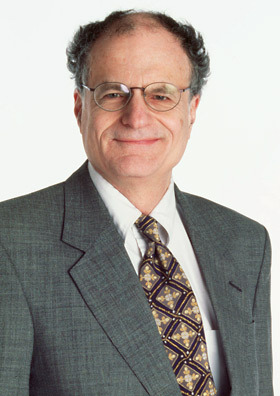Innovation would help Korea combat low growth, Nobel laureate says
QE exit by advanced economies not likely to affect Korea, emerging markets
By Park Hyung-kiPublished : June 3, 2013 - 20:09
The Korean government should only intervene in the market to encourage competition and innovation in the private sector in an effort to overcome the country’s long period of low growth, said Thomas J. Sargent, the winner of the 2011 Nobel Prize in Economics.
Once underdeveloped or developing countries catch up to advanced economies, they should turn their focus to innovation as there are fewer opportunities in copying what developed countries have done for growth, he said.
Sargent, also an economics professor at New York University, said this was the case with Korea, whose economy was poorer than Argentina’s and even North Korea’s 50 years ago, but now was far ahead of both.
Once underdeveloped or developing countries catch up to advanced economies, they should turn their focus to innovation as there are fewer opportunities in copying what developed countries have done for growth, he said.
Sargent, also an economics professor at New York University, said this was the case with Korea, whose economy was poorer than Argentina’s and even North Korea’s 50 years ago, but now was far ahead of both.

Korea would face “consequences of its miracle growth,” he also told the press on the sidelines of a conference hosted by the Bank of Korea on Monday.
The country will not be able to grow as fast as it had, and its “destiny will grow more like the U.S.”
Innovation and investment in pure research and development would lead to growth, Sargent said.
Nonetheless, the pace of Korea’s growth would be much slower than before as its economy has matured and advanced.
“That’s just (growth) pattern that’s being repeated,” he said.
The economist also said that he was not particularly against governments’ market intervention, but suggested that they should do so through “wise and coherent policies.”
“I, myself, and many others are not automatically opposing government intervention in the economy,” Sargent said.
Governments provide public goods, enforce competition and try to make up for what the private sector cannot do.
However, governments should allow private households and companies to lead in those areas if it is “plausible that they can do those things alone,” he said.
The Nobel laureate added that a possible exit from advanced economies’ monetary easing in the near future was not likely to adversely affect Korea and emerging markets as many feared.
Advanced countries have been implementing quantitative easing, an “unprecedented and experimental” policy of printing and pumping money into markets to stave off further downturns.
Given the lack of data of how such unorthodox policy effectively worked before, all the market really has are theories.
And one of the theories, going back to those of Adam Smith, showed that quantitative easing would not make any difference, the economist said.
“If that theory is right, exiting QE is not going to be a problem,” said Sargent.
By Park Hyong-ki (hkp@heraldcorp.com)








![[KH Explains] Hyundai-backed Motional’s struggles deepen as Tesla eyes August robotaxi debut](http://res.heraldm.com/phpwas/restmb_idxmake.php?idx=644&simg=/content/image/2024/05/16/20240516050605_0.jpg&u=20240516155018)









